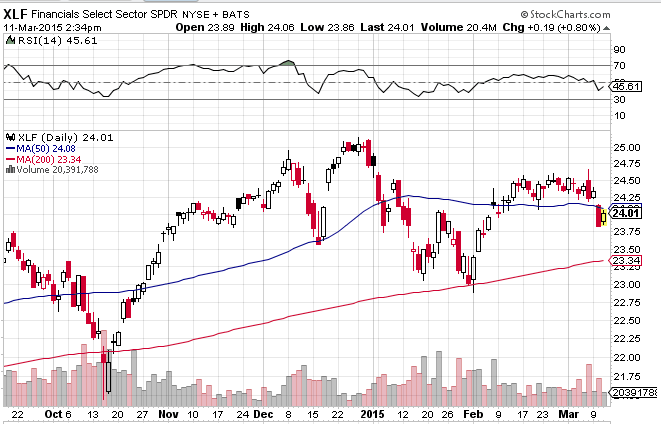Bank ETFs Rise On Capital Requirement Rules
Post on: 16 Март, 2015 No Comment

Now that the financial crisis appears to finally be subsiding, many regulators and economists have shifted their focus away from containment and towards prevention, seeking to ensure that a similar meltdown does not devastate markets again. Over the weekend, regulators finally hammered out a plan to force banks to limit risk and keep more adequate levels of reserves in case of a future crisis in what is popularly being referred to as the Basel III accord. The details of the plan call for minimum capital requirements to double from their current levels of 2% and the total equity ratio to surge from its current 4% to 7%. Firms will also be required to boost their tier one capital ratios up to 6% and will have to develop a 2.5% buffer to protect against future crises. Institutions unable to meet this requirement would be unable to pay dividends but not forced to raise new funds.
While the ratio increases do represent significant changes for many banks, financial institutions will have plenty of time to comply with the rules: a little less than five years for the minimum ratios and until the start of 2019 to comply with the 2.5% buffer requirement. This lengthy amount of time helped to soothe investor fears over regulatory plans, which many fears would be enacted too quickly and could hurt the financial system by forcing banks to cut back on lending and quickly raise new capital reserves. “These are big changes in capital requirements,” said James Wiener. the New York-based head of finance and risk practice at Oliver Wyman, a management-consulting firm. “There’s a long period of adjustment, which takes off some pressure. But still, who wants to own a bank that can’t pay dividends for three years?”
With this concern finally out of the way, the financial sector shrugged off some of the longer-term concerns and experienced broad gains across much of the globe, which helped to spark a rally in international equity markets. Not surprisingly, the boost has helped to send financial ETFs sharply higher with all the ETFs in the Financial Equities ETFdb Category posting gains in the early part of Monday trading. Below, we profile three ETFs which have seen their shares jump the highest on the news:
KBE
The broad SPDR KBW Bank ETF (KBE ) surged higher by 3% in todays trading thanks in large part to the generous time that regulators have given to banks to comply with the new rules. That helped to boost struggling financial firms such as Citigroup, which makes up the top holding of KBE at just over 10% of the total assets. In addition to Citigroup, the fund offers high allocations towards JP Morgan, Bank of America and Wells Fargo. KBE has gained more than 12.5% on the year [see Seven Surprising ETF Leaders Of 2010 ].
RKH

Among the biggest gainers on the news were regional bank ETFs, which all saw their shares rise by more than 3% during early Monday trading. The biggest gainer of these funds was the Regional Bank HOLDR (RKH ), which jumped by 3.5% on the new bank capital rules. Like most HOLDRs, this fund is heavily concentrated in its top holdings; its top ten allocations make up more than 91% of the funds total assets. Todays gains have helped to push the fund into positive territory on the year, the fund is now up about 1% since the beginning of January [also read Three Sector ETFs With Sky-High Betas ].
AXFN
The biggest gainer in the financial sector of the ETF world was the thinly traded iShares MSCI ACWI ex US Financials Sector Index Fund (AXFN ), which was up close to 4% in early Monday trading. The fund tracks the MSCI All Country World ex USA Financials Index. a free float-adjusted, market capitalization-weighted benchmark designed to measure the combined equity market performance of the financials sector of developed and emerging markets countries, excluding the United States. Thanks to heavy allocations to companies in Australia, Canada, and Asia, which have been among the most conservative banks in the world and less impacted by the financial crisis and the euro zone debt debacle, this fund has outperformed all others on the news of the new Basel rules. This fund has gained about 5% since its launch earlier this year [see Financial ETFs: Seven Ways To Play ].














